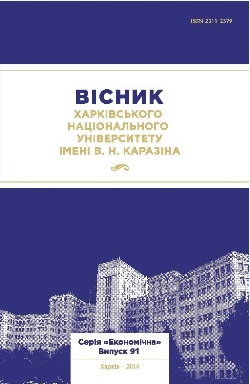The multiagent model of the tax behavior of the economical agents
Abstract
The model of behavior of mobile economical agents, who act in several jurisdictions, is overviewed in the article.
Since there is a lot of research works of the tax behavior, but among them there is a few of those where the models would take into account heterogeneity of tax payers and specifics of their behavior, this model uses multiagent approach.
The main focus is on the tax behavior (agents can either pay taxes or evade), consumer behavior (agents can accumulate or consume the income) and migration behavior (agents can evaluate the attractiveness of other jurisdictions, and, if they are not satisfied with their own one, agents can migrate there).
Each agent has in their property labor, capital or both of these factors of production. During the model run agent receives income as a return from the corresponding factors of production, for each factor separately, depending on the infrastructure provided by a jurisdiction (business public goods or social public goods). A certain share of income the agent pays as taxes (or evades paying), and then distributes the rest between consumption and saving. In case of saving level decrease the agent starts looking for a jurisdiction with potentially better conditions.
A jurisdiction spends all collected taxes to creation of public goods and to transaction costs.
The result of the simulation is data of population structure, migration, taxes gathered, income consumed and accumulated, public goods created, sliced by jurisdiction.
The model is created as a standalone application program using Visual Basic programming language.
Downloads
References
OECD “Harmful Tax Competition: An Emerging Global Issue”. Tax Agreement on Exchange of Information in Tax Matters. [Electronic resource]. Way of access: http://www.oecd.org/ctp/harmful/2082215.pdf
Меркулова Т. В. Современные механизмы регулирования финансовых потоков: pro et contra международной налоговой конкуренции: Монография: Макроэкономическое регулирование финансовых потоков страны: теория и практика / Т. В. Меркулова. – К. : Киевский экономический институт менеджмента, 2012. – 280 с.
Gaëtan N. Corporate Tax Competition and Coordination in the European Union: What Do We Know? Where Do We Stand?, 2006. [Electronic resource]. / N. Gaëtan. – Way of access: http://ec.europa.eu/economy_finance/publications/publication718_en.pdf
Wilson J. Capital Tax Competiton: Bane or Boon/ J. Wilson, D. Wildasinb, – Journal of Public Economics. Amsterdam: Elsevier, 2004. 26 p.
Zipfel F. One Europe, one Tax? Plans for a Common Consolidated Corporate Tax Base / F. Zipfel. – Frankfurt: Deutsche Bank, 2007. 18 p.
Педь І. В. Податкова конкуренція: Монографія / І. В. Педь. – К. : Експерт-Консалтинг, 2009. – 406 с.
Tiebout C. A pure theory of local expenditures / C. Tiebout, – The journal of political economy. Chicago: University of Chicago Press, 1956. – 8 p.
Леонова Н. Модель налоговой конкуренции с учетом ограничения мобильных инвесторов / Н. Леонова, Г. Колесник, – Тверь. : НИИ Центрпрограммсистем, 2009. – 9 с.
Razin A. Fiscal and migration competition. [Electronic resource]. / A. Razin, E. Sadka. – Way of access: http://www.nber.org/papers/w16224
Hauptmeier S. Fiscal competition over taxes and public inputs theory and evidence, 2009. [Electronic resource]. / S. Hauptmeier, F. Mittermaier, J. Rincke. – Way of access: https://www.ecb.europa.eu/pub/pdf/scpwps/ecbwp1033.pdf?c3547c2c8cd54d3089a45c39c3d58096

